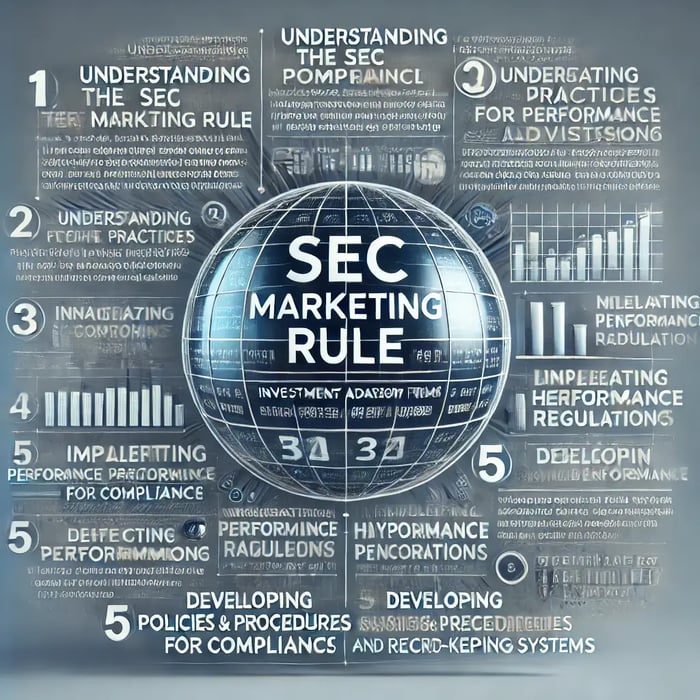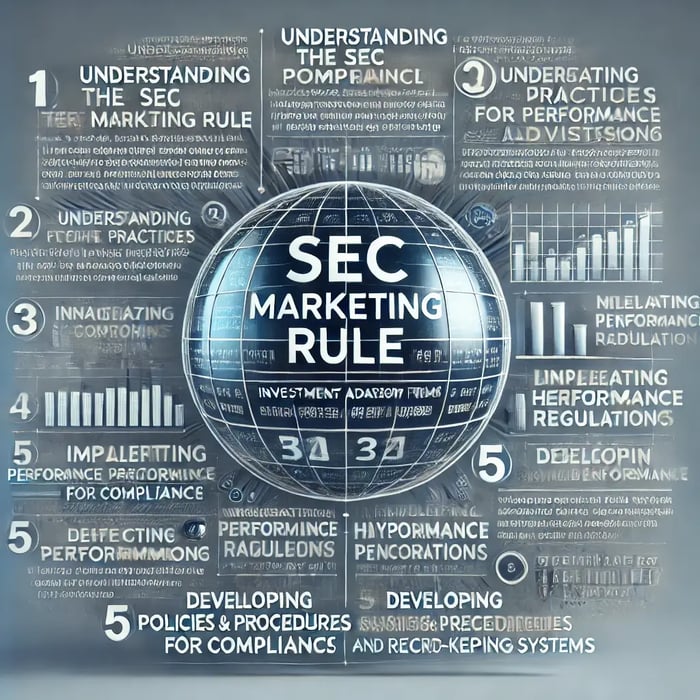 SEC Marketing Rule Compliance for Investment Advisory Firms
SEC Marketing Rule Compliance for Investment Advisory FirmsIn today’s regulatory environment, SEC marketing rule compliance for investment advisory firms is critical for maintaining client trust, avoiding penalties, and promoting services effectively. The SEC’s marketing rule, adopted in November 2022, imposes detailed guidelines that firms must follow when creating performance advertisements and other marketing materials. This article explores the steps firms need to take to align with these regulations, avoid common pitfalls, and achieve compliance.
This article summarizes an IAR CE class offered by Advisors4Advisors about SEC Marketing Rule Compliance for Investment Advisory Firms, The class was led by Amy Jones and Arin Stancil, of Guardian Performance Solutions, who both hold the Certificate in Investment Performance Measurement designation, which is licensed by the CFA Institute. Amy Jones and Arin Stancil teach once or twice a year on Advisors4Advisors for the past several years.
High-Quality IAR CE Webinars
This is the kind of high-quality IAR CE A4A provides. IARs, especially those who are state-registered, often do not have the resources to learn about performance advertising. Because of the serious penalties imposed for not complying with performance advertising rules, few RIAs with less than $300 million AUM have explored the possibility of marketing based on their track record. It's a highly technical area. However, performance advertising for IARs and owners of RIAs is a lot more doable these days, especially with assistance from AI. Moreover, IA reps who don't know the rules sometime make claims about their investment performance in marketing materials that break the SEC marketing rules and they don't know it -- until an examiner from the local SEC branch visits one day.
Helping Firms Navigate SEC Marketing Rule Compliance
Compliance with the SEC marketing rule can be complex, but firms that take a strategic approach can navigate it successfully. Key areas of focus include compiling compliant performance advertisements, writing appropriate disclosures, and establishing robust policies and procedures. Many firms also seek expert guidance to validate performance data and prepare for third-party verification. For those embracing SEC marketing rule compliance for investment advisory firms, a clear understanding of the regulations is essential.
The Expanded Definition of "Advertisement"
One of the most significant changes introduced by the SEC marketing rule is its broadened definition of an "advertisement." Under the new rule, almost any communication sent to multiple recipients—including mass emails, social media posts, and even one-on-one presentations with hypothetical performance data—is considered advertising. This change means many firms that previously believed they were not advertising now fall under the rule’s jurisdiction.
Advisors must recognize that even indirect communications, such as materials distributed by third parties or shared through social media, may qualify as advertisements. Adopting best practices for SEC marketing rule compliance for investment advisory firms ensures that all such communications meet regulatory standards.
Avoiding Common Violations
Firms often unknowingly violate SEC marketing rules by making statements they believe to be compliant but fail to substantiate. For example, claims about hypothetical performance or broad statements like “best in class” can lead to penalties if they cannot be backed by documented evidence. A key aspect of SEC marketing rule compliance for investment advisory firms is avoiding these pitfalls by carefully vetting all marketing materials.
The SEC has recently issued fines for violations related to hypothetical performance data, often discovered on public websites. These violations are easily identifiable and demonstrate the importance of restricting hypothetical performance to password-protected areas for approved audiences.
Gross and Net Performance Requirements
A cornerstone of the SEC marketing rule is the requirement to present both gross and net performance with equal prominence. Gross performance refers to returns before deducting fees and expenses, while net performance accounts for all applicable costs. Firms must use consistent methodologies for both metrics and ensure that disclosures are clear and accessible.
Compliance requires presenting performance for specific time periods, including one-, five-, and ten-year intervals, or since inception if the strategy is newer. These updates must be timely, reflecting performance through the most recent calendar year. Firms embracing SEC marketing rule compliance for investment advisory firms must prioritize accuracy and consistency in their performance reporting.
Policies, Procedures, and Record-Keeping
Implementing effective policies and procedures is vital for compliance. Firms must document how performance data is calculated, validated, and presented, ensuring consistency across all marketing materials. Comprehensive record-keeping is essential, particularly for closed accounts, as regulators may request this information during audits.
For investment advisory firms pursuing SEC marketing rule compliance, maintaining clear and detailed policies serves multiple purposes. Not only does it ensure adherence to regulations, but it also acts as a training tool for employees and a safeguard during regulatory reviews.
Hypothetical Performance Compliance
Hypothetical performance data, such as model portfolios or projections, presents unique compliance challenges. The SEC views hypothetical performance skeptically due to its potential to mislead investors. To comply, firms must:
- Restrict the distribution of hypothetical performance to qualified individuals with sufficient financial expertise.
- Adopt and implement policies ensuring the relevance of the data to the intended audience.
- Avoid public dissemination of hypothetical performance, such as on websites accessible to all.
These steps are essential for firms focused on SEC marketing rule compliance for investment advisory firms, as hypothetical performance remains a high-risk area for violations.
Related and Representative Performance
The SEC marketing rule emphasizes the importance of presenting related performance data, which includes results from all portfolios managed with similar strategies. Firms must aggregate these portfolios into composites or demonstrate that a representative account’s performance does not materially differ from the composite.
Creating and presenting these composites can be resource-intensive, but it is critical for compliance. Firms unable to meet these standards risk falling short of SEC marketing rule compliance for investment advisory firms and may face regulatory scrutiny.
Cost and Resource Considerations
Achieving compliance involves both financial and operational investments. Firms must evaluate their internal capabilities and determine whether they need external assistance. Options include hiring consultants, outsourcing performance reporting, or licensing software to handle data aggregation and analysis.
While these investments may seem significant, they are necessary to avoid the potentially greater costs of non-compliance. Recent enforcement actions by the SEC highlight the importance of aligning with the rules to mitigate risks and protect a firm’s reputation.
Real-World Examples of Compliance Challenges
The session highlighted practical examples to illustrate common challenges in SEC marketing rule compliance for investment advisory firms. For instance, firms that previously relied on representative account performance must now calculate and present composites to demonstrate compliance. Similarly, those using hypothetical performance must adopt stringent controls to ensure proper usage and distribution.
Another example involves fair and balanced disclosures. Firms must present both positive and negative aspects of their strategies, such as highlighting top-performing securities alongside underperformers. This principle extends to all materials, ensuring a balanced representation of potential risks and benefits.
Preparing for a Compliant Future
The SEC marketing rule represents a new era in investment advisory advertising, requiring firms to adopt stricter standards and more comprehensive practices. While challenging, compliance offers an opportunity to build trust with clients and demonstrate transparency.
Firms of all sizes, including those managing under $1 billion in assets, are increasingly engaging in performance advertising to stand out in a competitive market. By focusing on SEC marketing rule compliance for investment advisory firms, organizations can enhance their reputation, meet regulatory expectations, and confidently promote their services.
For investment advisors, prioritizing compliance is not just about avoiding penalties—it’s about building a sustainable and trustworthy brand in an ever-evolving industry.
If you are a CFP, CIMA,CPA/PFS, or CPA financial planning practitioner, free IAR CE about topics like the SEC Marketing Rule Compliance for Investment Advisory Firms comes with membership on Advisors4Advisors.




